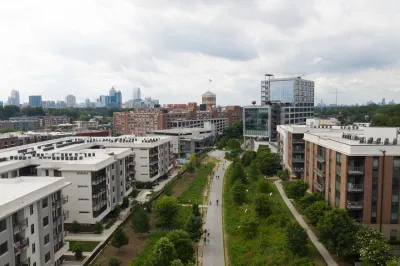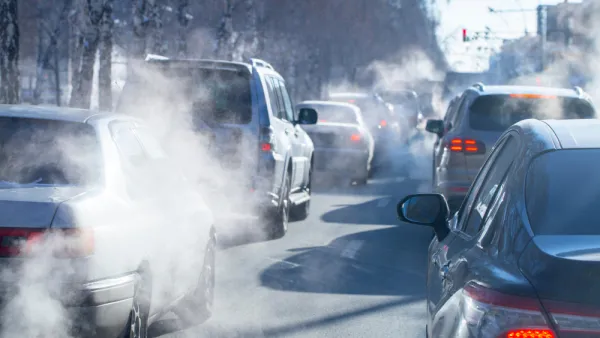The state is diversifying its energy sources to reduce carbon emissions by 50% by 2030, in line with federal climate goals.

The state of Georgia is making progress on its emissions reduction goals, "putting it closer to a new White House target of a 50% reduction in the U.S. by 2030 from 2005 levels," reports Matt Kempner for The Atlanta Journal-Constitution. The reductions are a result of "changes by not only big companies, developers and power producers but also individual metro Atlantans, many of whom have already partially reduced their carbon footprint, perhaps without fully realizing it." With an impressive 28% reduction in emissions between 2005 and 2018, "[f]ederal figures show that only five states have made larger percentage cuts than Georgia in carbon emissions from fossil fuel combustion."
The state's electric utility, Georgia Power, along with utilities across the country, has switched to natural gas for lower emissions. "Another carbon-free power source on the rise: solar power, with big gains in technology and far lower prices." The state is also poised to complete a nuclear power generation project.
"But there’s a lot more carbon to squeeze out, including in the electricity system, Georgia’s second-largest source of carbon belching, behind only transportation, according to the latest figures from the U.S. Environmental Protection Agency." Whereas in the past Georgia Power "has resisted federal mandates for change by power companies," Southern Company, Georgia Power's parent company, now "wants government policies that promote investments in research, development and deployment of new energy technologies, long-lasting batteries, new nuclear power options, energy efficiency and more favorable taxes." To promote cleaner energy, says Georgia's Sierra Club chair Daniel Blackman, "state elected officials need to reenact a canceled tax credit for electric vehicle purchases, boost construction of charging stations and push Georgia Power to close plants sooner."
FULL STORY: How Georgians might reach new U.S. target for 50% carbon cut

National Parks Layoffs Will Cause Communities to Lose Billions
Thousands of essential park workers were laid off this week, just before the busy spring break season.

Retro-silient?: America’s First “Eco-burb,” The Woodlands Turns 50
A master-planned community north of Houston offers lessons on green infrastructure and resilient design, but falls short of its founder’s lofty affordability and walkability goals.

Delivering for America Plan Will Downgrade Mail Service in at Least 49.5 Percent of Zip Codes
Republican and Democrat lawmakers criticize the plan for its disproportionate negative impact on rural communities.

Test News Post 1
This is a summary

Test News Headline 46
Test for the image on the front page.

Balancing Bombs and Butterflies: How the National Guard Protects a Rare Species
The National Guard at Fort Indiantown Gap uses GIS technology and land management strategies to balance military training with conservation efforts, ensuring the survival of the rare eastern regal fritillary butterfly.
Urban Design for Planners 1: Software Tools
This six-course series explores essential urban design concepts using open source software and equips planners with the tools they need to participate fully in the urban design process.
Planning for Universal Design
Learn the tools for implementing Universal Design in planning regulations.
EMC Planning Group, Inc.
Planetizen
Planetizen
Mpact (formerly Rail~Volution)
Great Falls Development Authority, Inc.
HUDs Office of Policy Development and Research
NYU Wagner Graduate School of Public Service





























